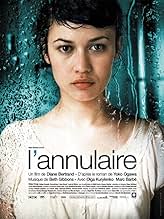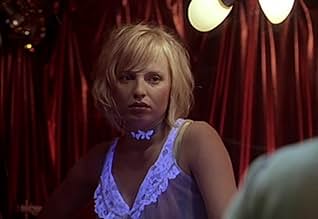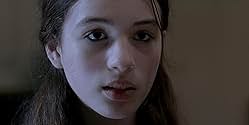CALIFICACIÓN DE IMDb
6.1/10
1.3 k
TU CALIFICACIÓN
Agrega una trama en tu idiomaIris finds a new job working in a preservation lab where she gradually enters into a troubled relationship with her boss.Iris finds a new job working in a preservation lab where she gradually enters into a troubled relationship with her boss.Iris finds a new job working in a preservation lab where she gradually enters into a troubled relationship with her boss.
- Premios
- 1 premio ganado y 2 nominaciones en total
Louis Dewynter
- L'enfant
- (as Louis de Winter)
Anja Gräfenstein
- La prostituée
- (as Anja Boche)
- Dirección
- Guionistas
- Todo el elenco y el equipo
- Producción, taquilla y más en IMDbPro
Opiniones destacadas
A city with no name, a young woman with no history, a house apart - a strange island in a sea of trees. I like the lack of references to anything external to this system. The world of this movie is airtight. I'm reminded of the famous story retold by W. Somerset Maugham, "Appointment in Samarra", where a man, upon bumping into Death in the streets of Baghdad, flees to Samarra to avoid his wrath, but instead runs into Death who is waiting for him in Samarra, and whose anger at the jostling in Baghdad is revealed to have been mere surprise, as he had been expecting to see the man in Samarra later in the day. The sealed nature of this film demands a focus on inevitability.
A young woman, Iris, wanders alone in the port area of the city, along superannuated towpaths, past the gigantic hulks of international shipping; outside of work the closest she comes to really being with others is staring at prostitutes behind plate glass, or contemplating entering a bar. There's something brutal about the isolation of Iris by the filmmaker. When I reviewed In The City of Sylvia, similarly a beautiful movie with an isolated character, I said that the filmmaker should either have won the Golden Lion at Venice or have been brutally murdered; I've similar feelings here.
Today is Sunday and I've been sat in a deserted office building writing this review, ostensibly here to study for exams, but procrastinating somewhat. The morning streets are almost empty, a white contrail hints at faraway adventures that I'll never be part of, the river is full of empty boats. There is nothing good about being alone; the beauty of it is only a subtle form of cruelty.
The soundtrack of the movie is done by Beth Gibbons of Portishead; its fractured entropised lilt is just right; you only ever catch fragments of lyrics.
Iris gets work as the sole employee in the strange set aside laboratory. The laboratory offers a simple service whereby people may come and, for a fee, have items preserved and stored away. This seems quite a perverse thing to do. Memory, which it seems this film is about, IS perverse. Recently I wrote three poems to a woman I love, who I later learnt has no desire to be with me, I never gave them to her. A colleague tells me I should burn them, and that is perhaps the best thing to do, but perversity wills me to preserve them, to torture myself. Memory becomes viscous ooze in which you are trapped, finally it solidifies and turns into amber. People (mostly children) who can live in the moment, truly do not know how lucky they are.
Some have called the film erotic, however the erotic whilst present, is as intangible as a passing cloud on a sunny day. Marc Barbé's conserver remains inscrutable and devoid of passion during sex scenes. Sex scenes with him are no more or less sensual than seeing a spider cocooning a fly, trapped for inclusion in its larder. One quite disturbing picture from above shows us an image of his head on Iris' body, he is merely consuming her.
Other aspects of the erotic are fetishistic, the focus on the shoes that Iris is made to wear for her work, her clothing, which the sailor who sleeps in her room in the morning feels and smells in her absence. The movie brought to mind for me Magritte's two famous fetishistic paintings, The Red Model, and Philosophy in the Boudoir, both of which show clothing suggesting the female form. (Philosophy in the Boudoir also came to mind during In The City of Sylvia).
Mahjong came into play as it does in all good surreal movies (cross-reference to Robbe-Grillet's The Blue Villa). You could if you want see Iris as a flower tile, and the laboratory door as the white dragon tile (which is a blank tile in Mahjong, or blankness with a rectangular border). These are symbolic, but I don't want to spoil the movie by mentioning how.
Do not watch this movie, arrange to have all copies burnt!
A young woman, Iris, wanders alone in the port area of the city, along superannuated towpaths, past the gigantic hulks of international shipping; outside of work the closest she comes to really being with others is staring at prostitutes behind plate glass, or contemplating entering a bar. There's something brutal about the isolation of Iris by the filmmaker. When I reviewed In The City of Sylvia, similarly a beautiful movie with an isolated character, I said that the filmmaker should either have won the Golden Lion at Venice or have been brutally murdered; I've similar feelings here.
Today is Sunday and I've been sat in a deserted office building writing this review, ostensibly here to study for exams, but procrastinating somewhat. The morning streets are almost empty, a white contrail hints at faraway adventures that I'll never be part of, the river is full of empty boats. There is nothing good about being alone; the beauty of it is only a subtle form of cruelty.
The soundtrack of the movie is done by Beth Gibbons of Portishead; its fractured entropised lilt is just right; you only ever catch fragments of lyrics.
Iris gets work as the sole employee in the strange set aside laboratory. The laboratory offers a simple service whereby people may come and, for a fee, have items preserved and stored away. This seems quite a perverse thing to do. Memory, which it seems this film is about, IS perverse. Recently I wrote three poems to a woman I love, who I later learnt has no desire to be with me, I never gave them to her. A colleague tells me I should burn them, and that is perhaps the best thing to do, but perversity wills me to preserve them, to torture myself. Memory becomes viscous ooze in which you are trapped, finally it solidifies and turns into amber. People (mostly children) who can live in the moment, truly do not know how lucky they are.
Some have called the film erotic, however the erotic whilst present, is as intangible as a passing cloud on a sunny day. Marc Barbé's conserver remains inscrutable and devoid of passion during sex scenes. Sex scenes with him are no more or less sensual than seeing a spider cocooning a fly, trapped for inclusion in its larder. One quite disturbing picture from above shows us an image of his head on Iris' body, he is merely consuming her.
Other aspects of the erotic are fetishistic, the focus on the shoes that Iris is made to wear for her work, her clothing, which the sailor who sleeps in her room in the morning feels and smells in her absence. The movie brought to mind for me Magritte's two famous fetishistic paintings, The Red Model, and Philosophy in the Boudoir, both of which show clothing suggesting the female form. (Philosophy in the Boudoir also came to mind during In The City of Sylvia).
Mahjong came into play as it does in all good surreal movies (cross-reference to Robbe-Grillet's The Blue Villa). You could if you want see Iris as a flower tile, and the laboratory door as the white dragon tile (which is a blank tile in Mahjong, or blankness with a rectangular border). These are symbolic, but I don't want to spoil the movie by mentioning how.
Do not watch this movie, arrange to have all copies burnt!
There were a lot of things I enjoyed about this movie. The cover, the synopsis and the concept were really the high points. The lead actress was quite good as well (not bad to look at too). I mean the cinematography was good I guess, but nothing to out the ordinary. I mean you can't rely on gritty filters and a softened colour palate to carry a movie. The concept for this movie really intrigued me and I had begged my friends to rent it a couple times by the cover(instead of "Poisidon" and "When a Stranger Calls"). Just it seemed to me that it was trying too hard to be something and wasn't focusing enough on characters actual motivations and any connection with the real world. "Who is this girl?" is what I'm sure would have been the question if I had convinced anyone I know to watch it with me.
Don't bother. Heard its hard to find so should be a problem for most people.
Don't bother. Heard its hard to find so should be a problem for most people.
The sexy Ukrainian Bond-babe (from Quantum of Solace) Olga Kurylenko's first film was L'Annulaire (2005) . Iris (Kurylenko) have an accident and cut off her ring finger. Then she moves to a port town (filmed in Hamburg), and lodging in a hotel by the seafront. She gets a job as an assistant and receptionist for a man who preserve peoples specials items into specimen. The guy and the place is weird, and he comes up with some requirements to her, that makes the job and employer even weirder. It's originally a Japanese novel by Yoko Ogawa, and there is some strange Japanese atmosphere over this story. The movie is packed with the nude Iris, and I guess that alone will please a lot of male viewers. I think the story was going a bit empty after a while, but I'm a male viewer - so I stayed tune with the beautiful Iris until the final.
Saw this at TIFF 2005, my buddy and I went into this movie with no expectations and it ended up being a favorite (top 3 for me) of the film-fest. Unlike most at the fest, the pacing was perfect and each scene was necessary, it's a rare movie today that has such tight editing. The mystery and eros has a slow-burning build....
This was the only film I attended at the fest that left the audience hushed during the credits as well. I wouldn't call it 'eerie', maybe 'otherworldly'? Reminded me a little of polanski's ninth gate somewhat (and that's a good thing), but I doubt that anyone else would make that comparison :) I've been thinking about this movie for five months, figured it would be a shoe-in on the art-house circuit, but haven't heard much yet, this movie deserves to be seen!
This was the only film I attended at the fest that left the audience hushed during the credits as well. I wouldn't call it 'eerie', maybe 'otherworldly'? Reminded me a little of polanski's ninth gate somewhat (and that's a good thing), but I doubt that anyone else would make that comparison :) I've been thinking about this movie for five months, figured it would be a shoe-in on the art-house circuit, but haven't heard much yet, this movie deserves to be seen!
This film did not turn up on my radar back in 2005. That's not surprising, I think, given the complexity and opaqueness of the story which together renders such a movie as box-office poison. It is, however, a cleverly contrived fable about unresolved needs and dreams – and all with a distinct nod to David Lynch, arguably the master of complex mystery and film-making – and all dressed up with appropriate symbolism and metaphor.
Every city has lonely people and Iris (Olga Kurylenko) is one such young woman working as a drudge on an assembly line in a bottling factory at a major sea port. Her face is set, sullen and almost sad as she helps the bottles along clattering rollers. She doesn't see a broken bottle and cuts her ring finger badly, gushing copious blood around. The wound is dressed at a medical office where, overcome by stress and pain, she lapses into sleep, almost in a fetal position.
With a quick jump-cut, we next see Iris renting a room at a seaport dive for sailors – a direct symbol for one of her needs – and then obtaining a job as an "office manager" at an obscure laboratory where she assists with the screening of people who wish to preserve things of value. The pale-faced laboratory owner (Marc Barbe) is authoritative, austere, and abrupt at first, and always dressed the same: black trousers and shoes, white shirt and long white laboratory coat that billows out as he strides around each day, seeing to the work within the 100 plus rooms in the old college he bought to house all the preserved "specimens" he keeps for clients.
As time passes, he becomes more interested in Iris, more attentive and finally more possessive – providing a clue as to why prior female office managers had apparently left hurriedly. Iris, however, allows herself to succumb to his wishes and desires – and thereby satisfies another of her secret needs; and which also result in the brief, highly erotic love making that simply confirms the depth of her deprived emotional needs. Incidentally, as part of their "contract" he insists that she wears a pair of high-heeled red shoes – always.
At the same time, Iris also evinces interest in the young sailor at the hotel with whom she shares a room but – he being on shift work – without ever seeing him, only savoring the lingering smell on his bed and clothes. It appears that the sailor is equally interested when we see him doing the same with her clothes when alone in the room.
Curiosity, though, drives Iris even further with her need to see the laboratory in which specimens are prepared. She asks her employer if she can see him work, but he refuses. But she persists as she gains more favor with him and eventually manages to convince him she is worthy.
Few viewers, I think, will be satisfied with the closing scenes and may remain mystified. They do, however, provide closure for the entire story and Iris's experience.
The film is distinctive with just enough dialog, long takes, seemingly erratic cuts, a riveting sound track that's difficult to hear properly, and mostly nameless characters, including an enigmatic shoe-shine expert of fifty years. It all adds to the mystery but some viewers will be dissatisfied, even repelled.
From that overall perspective, and like David Lynch, the director (Diane Bertrand) has left viewers to interpret the story according to their own beliefs and experiences. Like Lynch's movies, there are long, dark corridors, extreme close-ups, unexplained scenes (for example, Iris swinging on the end of a large crane cable's hook), unexplained time shifts, unexplained appearances of others who seem to add nothing to the story, and, of course, an enigmatic ending. Bertrand doesn't achieve the same type of suspense, though; that, however, may be deliberate because the subject matter here doesn't have the same darkly evil connotations so evident in most of what Lynch has done.
Still, if you like Lynch, I highly recommend this film; and the director, as an interesting and promising companion, perhaps. Give this a seven.
August 2011.
Every city has lonely people and Iris (Olga Kurylenko) is one such young woman working as a drudge on an assembly line in a bottling factory at a major sea port. Her face is set, sullen and almost sad as she helps the bottles along clattering rollers. She doesn't see a broken bottle and cuts her ring finger badly, gushing copious blood around. The wound is dressed at a medical office where, overcome by stress and pain, she lapses into sleep, almost in a fetal position.
With a quick jump-cut, we next see Iris renting a room at a seaport dive for sailors – a direct symbol for one of her needs – and then obtaining a job as an "office manager" at an obscure laboratory where she assists with the screening of people who wish to preserve things of value. The pale-faced laboratory owner (Marc Barbe) is authoritative, austere, and abrupt at first, and always dressed the same: black trousers and shoes, white shirt and long white laboratory coat that billows out as he strides around each day, seeing to the work within the 100 plus rooms in the old college he bought to house all the preserved "specimens" he keeps for clients.
As time passes, he becomes more interested in Iris, more attentive and finally more possessive – providing a clue as to why prior female office managers had apparently left hurriedly. Iris, however, allows herself to succumb to his wishes and desires – and thereby satisfies another of her secret needs; and which also result in the brief, highly erotic love making that simply confirms the depth of her deprived emotional needs. Incidentally, as part of their "contract" he insists that she wears a pair of high-heeled red shoes – always.
At the same time, Iris also evinces interest in the young sailor at the hotel with whom she shares a room but – he being on shift work – without ever seeing him, only savoring the lingering smell on his bed and clothes. It appears that the sailor is equally interested when we see him doing the same with her clothes when alone in the room.
Curiosity, though, drives Iris even further with her need to see the laboratory in which specimens are prepared. She asks her employer if she can see him work, but he refuses. But she persists as she gains more favor with him and eventually manages to convince him she is worthy.
Few viewers, I think, will be satisfied with the closing scenes and may remain mystified. They do, however, provide closure for the entire story and Iris's experience.
The film is distinctive with just enough dialog, long takes, seemingly erratic cuts, a riveting sound track that's difficult to hear properly, and mostly nameless characters, including an enigmatic shoe-shine expert of fifty years. It all adds to the mystery but some viewers will be dissatisfied, even repelled.
From that overall perspective, and like David Lynch, the director (Diane Bertrand) has left viewers to interpret the story according to their own beliefs and experiences. Like Lynch's movies, there are long, dark corridors, extreme close-ups, unexplained scenes (for example, Iris swinging on the end of a large crane cable's hook), unexplained time shifts, unexplained appearances of others who seem to add nothing to the story, and, of course, an enigmatic ending. Bertrand doesn't achieve the same type of suspense, though; that, however, may be deliberate because the subject matter here doesn't have the same darkly evil connotations so evident in most of what Lynch has done.
Still, if you like Lynch, I highly recommend this film; and the director, as an interesting and promising companion, perhaps. Give this a seven.
August 2011.
¿Sabías que…?
Selecciones populares
Inicia sesión para calificar y agrega a la lista de videos para obtener recomendaciones personalizadas
- How long is The Ring Finger?Con tecnología de Alexa
Detalles
Taquilla
- Total a nivel mundial
- USD 17,395
Contribuir a esta página
Sugiere una edición o agrega el contenido que falta

Principales brechas de datos
By what name was The Ring Finger (2005) officially released in Canada in English?
Responda

























